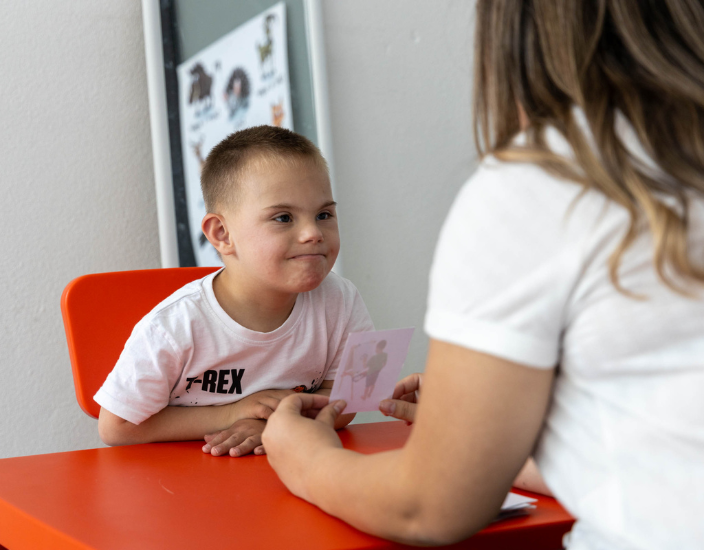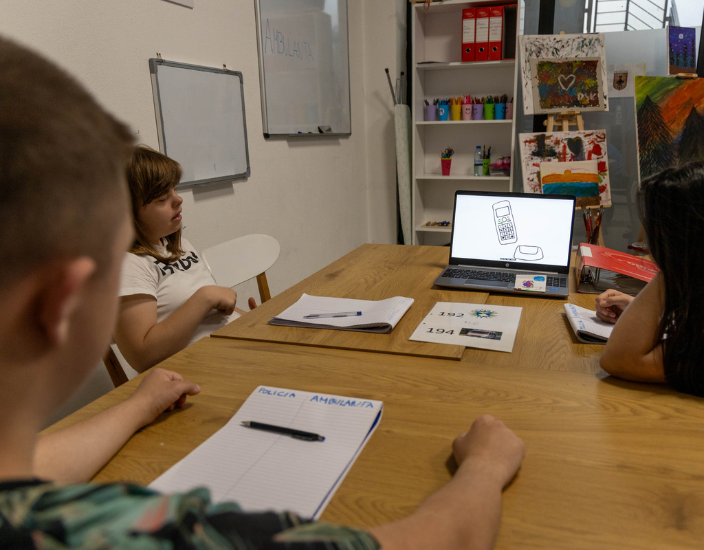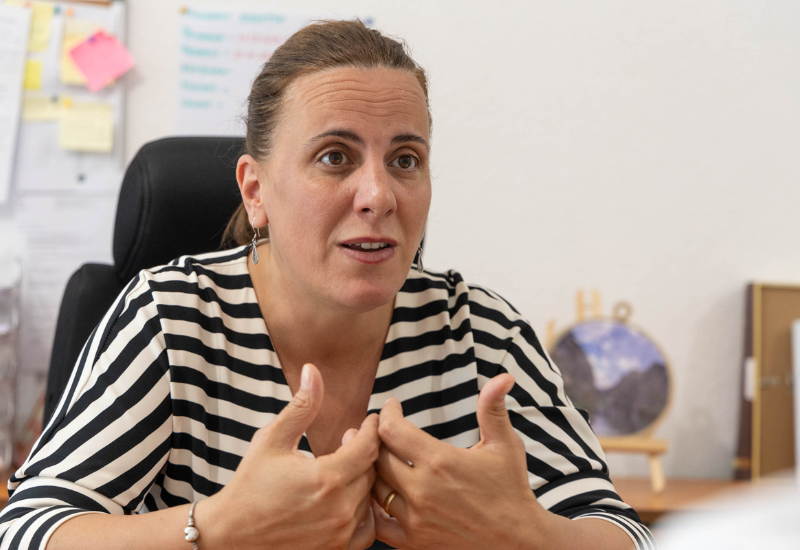Founded in March 2007, the mission of the “Down Syndrome Kosova” Association is the promotion, respect and protection of the rights of people with Down syndrome in Kosovo and their family members.
The association works to raise their dignity, advocating and lobbying for their rights and respect of these rights, for improving the quality of life and full inclusiveness in society.
Sebahate Beqiri, the executive director, shared how the “Down Syndrome Kosova” Association was founded, its mission, activities and its operation in general.
How was the “Down Syndrome Kosova” Association founded and what was its journey like?
Sebahate Beqiri: In 2005, my child was born with Down syndrome, about which I knew almost nothing. People staring was not a good feeling. Faced with a lack of proper information about this syndrome, not only information that I could get from other people, but also from the doctors themselves, or better say, the low level of awareness of society in general, I decided to start searching for other parents who were in the same situation as mine and to see children with Down syndrome up close. While observing all this situation, I began thinking everyday more and more that something must be done for this community, that is why I initiated the establishment of the “Down Syndrome Kosova” Association together with other parents, on 4 March 2007.
The beginning was not easy at all. We were a group of parents ready to make changes in society, but at the same time we had families who have been isolated, who lived with the stigma that having a child with Down syndrome is something others should not see or know. Among other things, it was also very challenging to enrol a child with Down syndrome in day care.
One thing is certain that the "Down Syndrome Kosova" Association, during its journey from 2007, in addition to the importance it has devoted to the creation of therapeutic support services for people with Down syndrome, has also played and continues to play a very important role in the field of advocacy. We have undertaken many initiatives which have been beneficial not only for the community we represent, but also for all groups of citizens with disabilities in the Republic of Kosovo. We have made the most important difference, which is raising the level of awareness not only of families or parents who have children with Down syndrome, but of Kosovar society in general.

How does the association operate now?
Sebahate Beqiri: The “Down Syndrome Kosova” Association already has five centres throughout Kosovo, i.e., in Prishtina, Prizren, Mitrovica, Ferizaj and Gjakova. This association has an early intervention and education program, within which therapeutic services are provided for children aged 0-12 years, and which also includes a training component. In the latter, there are trainings provided for teachers, educators and other professionals of the field, trainings and information sessions for parents. Among other things, we also support children who are part of our services. We support them in the institutions where they are enrolled, be it in kindergarten, day care or school.
Within the association, we also have the program for autonomy and vocational training, the beneficiaries of which are people over the age of 12. Within this program, the purpose of which is to prepare a person with Down syndrome for independent living, for the labour market, we have the vocational training class, the academic support class, the sexual education class and the autonomy class. We also have the advocacy program, through which we managed to make a very substantial contribution in terms of the protection of rights, not only of the community we represent and the realization of their rights, but also of other groups of people with disabilities.
Currently, the “Down Syndrome Kosova” Association has over 1,000 members, while over 300 people have been direct beneficiaries since its foundation, including all age groups. The association has a collaboration with the Genetics Laboratory within the University Clinical Centre of Kosovo (UCCK), where they run cytogenetic tests. In cases where a baby's test results positive for Down syndrome, a form is filled out and we receive the data from the laboratory. However, we also have cases when parents come from the laboratory directly to us, after being informed by the staff that there is an association that works with this community. Also, there are cases where parents contact us immediately on social networks, after having seen an interview or a TV program where someone from our staff was involved, and we immediately arrange a meeting with them, at the moment we have such a request.
As for the staff of the association, 54 people are part of it, including professionals of the field such as psychologists, physiotherapists, speech therapists and social workers. Our criterion is that each therapist works with a maximum of five or six children. This is because we want to provide only professional and proper services, as we do not want to be known only for the services we provide, rather we protect with egoism and stand behind the quality of the services we provide.
How is the “Down Syndrome Kosova” Association financed?
Sebahate Beqiri: Unfortunately, we still do not have a stable system of financing services by responsible public institutions and this makes our daily work difficult.
The main financiers of the “Down Syndrome Kosova” Association have always been international organizations. However, we are also financed through various projects of local organizations, through public institutions in cases where they open calls for subsidies, and fortunately we are also supported from our businesses. In addition, we also have individuals who have been contributing to our association for years, such as the case of a person who lives in Switzerland, who has been our donor for four years in a row and supports the services we provide for children.
In addition to these, we also have products that we create within our programs, such as postcards, honey, candles, and any citizen or business can contribute by purchasing them. Now it has already become a tradition to buy postcards especially for the end-of-year holidays by different businesses or institutions, from which we ensure a satisfactory fund.
What should definitely be emphasized is that all donations are made through the bank. Our practice is to make every donation public on our social networks. In cases where the donor wishes to remain anonymous, we make public only the donated amount or material.

How does the community engage in your work?
Sebahate Beqiri: As an association, we are very open to volunteers. Certainly, we have several procedures for their admission, starting with a questionnaire, and then with the receipt of relevant documents, such as a biography, a certificate that proves that he/she is not in any judicial proceeding or that no investigation is underway against him/ her, and similar documents that prove that he/she is appropriate to join our association, either as a volunteer or even as an employee.
We also have a campaign, where we managed to calculate the average expenses of how much we need for a child per month, which turns out to be an amount of 80 euros. From this campaign, we have cases where an individual or a business wants to take on two or three children to support them with our services. In these cases, we continuously keep the donor informed about the progress of the services, i.e., how much success was achieved.
We also manage to support young professionals and help them academically. We have had many students who have been engaged in voluntary work in the association and, in a way, have completed their internship with us, which has helped them to continue their Master's studies abroad.
So, the activities that we carry out every day not only help the community we represent and their parents, but they also help students, young people, and, in my opinion, this is one of the best examples of how an institution or non-governmental organization can contribute to the philanthropy in Kosovo.
What are some of the challenges faced by "Down Syndrome Kosova" and what do you consider to be your greatest success?
Sebahate Beqiri: One of the biggest challenges we face is financial instability, especially considering how vital therapeutic services are for a child with Down syndrome, for the development of his/her potential. Every day, we work hard on advocacy so that public institutions take responsibility for the services, and not only the associations, since there are still many individuals living in rural areas or regions where we do not have centres and it is impossible for them to access the services we provide.
However, during the performance of our work, every day we identify challenges that this community faces, starting from prejudices of different natures at certain times, the non-compliance with the laws in force for persons with disabilities, which also include people with Down syndrome. In particular, the issue of involving people with Down syndrome in education still remains very challenging. In cases where they become part of regular schools, they face problems due to the lack of an individual plan for them.
I believe that the greatest success of the association is the raising of the level of awareness regarding Down syndrome in the Kosovar society in general. Another success is the positive progress regarding the employment of persons with this syndrome, especially in the last three years, where a greater willingness of mainly private businesses/institutions about this initiative can be observed. So far, we have found jobs for 16 people with Down syndrome with regular employment contracts, where one of them is employed in a public institution and the other 15 in private ones.
Another success of ours is that, as an association, since 2016, we initiated the drafting of the law that will treat all persons with disabilities equally, since the legislation in force does not do so, i.e., it is discriminatory. In this regard, we have already finalized the draft law and we are waiting for the other procedures for the same to be approved.

What is your motivation to work in the non-profit sector?
Sebahate Beqiri: My greatest motivation is my son. However, seeing all this success that the association has achieved, seeing that big changes have been made for the community from one initiative, is another great motivation for me.
These are exactly the reasons that push me to work further to achieve other goals, among which is the expansion of the association in two large regions still not covered, which are Peja and Gjilan. Another goal is to advance our services and continue the support for educators, for teachers who must undergo the appropriate training so that children with Down syndrome receive the appropriate professional services and get dignified treatment wherever they are.
This interview is made possible by the generous support of the American people through the United States Agency for International Development (USAID). The contents are the responsibility of Catalyst Balkans and do not necessarily reflect the views of USAID or the United States Government.
The Citizen Engagement Activity in Kosovo is a five-year initiative implemented by Kosovar Civil Society Foundation (KCSF) in partnership with the United States Agency for International Development (USAID).
Photo credits: Arbër Gjoni

Leave a comment